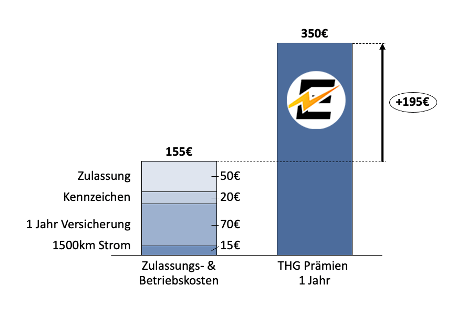
Apply for a bonus for 2023 now!
Are you the owner of a purely electric vehicle? Then you deserve a bonus! Secure your THG bonus now: up to 425 euros for 2023.
- Simple: Apply for the THG bonus completely online
- Safe: Payout up to €425
Have you not secured a GHG bonus for 2023 yet? It's worth being quick!
Apply now at https://thg-Experten.de/ or https://elektrogewinn.de/
Over 120,000 vehicles registered, 14 million euros paid out. Benefit too!
Especially now that spring is showing itself in all its glory, you can hear this quiet humming more often again. We're not talking about bees buzzing around diligently collecting pollen, but rather about the unrelated mopeds. Although they also buzz around ice cream parlors, they usually keep their distance from the cold dessert. Nevertheless, S-Pedelecs and e-scooters do us a great service and are therefore becoming increasingly popular.
We are therefore receiving more and more inquiries as to whether there is also a GHG bonus for these vehicles and, if so, how much. This is also a hotly debated topic in the popular electric scooter forums. We have therefore decided to get to the bottom of the issue and clarify once and for all whether the THG premium can also be applied for for a two-wheeler in class L1e/L1e-A.
The good news in advance: Yes, the GHG quota can also be certified for mopeds up to 45km/h and thus generate a bonus. We have already successfully processed the THG application for some happy customers and paid out a bonus of €350. A real insider tip!
However, for successful certification, just like an eCar, a Part 1 registration certificate, i.e. the so-called vehicle registration document, is required. But now again from the beginning how we come to this statement:
But as a rule, the environmentally conscious driver of a 45km/h bicycle or e-scooter only has a small insurance number and therefore no vehicle registration. Unfortunately, the formal conditions for the bonus application would not be met. However, there is now a possibility of receiving a bonus for a moped, the keyword here is: “Voluntary registration”.
For voluntary admission, the admissions office requires the following documents:
- ID card
- EVB number (you will receive this from your insurance company)
- Operating license, expert opinion if necessary, purchase contract
Cost overview of voluntary admission:
- One-off fees for the registration process: approx. €50
- Purchase of the license plate: approx. 15-20€
- Insurance fees (annually): 1st year approx. 70€, 2nd year approx. 50€, 3rd year approx. 20€...
- Taxes are not levied on mopeds
One of our first certified moped customers and proud driver of a 45km/h E-max 110s scooter kindly gave us the following information:
Approval was granted upon application in accordance with Section 3 Paragraph 3 FZV. Waiver of issuing HU sticker in accordance with §29 Paragraph 1 StVZO. (It remains a moped with 45km/h - so no TÜV necessary). Then I was given the registration sticker on the license plate and the registration certificate part 1 (vehicle registration document). The first registration date was noted on the CoC and stamped. This is now my “motor vehicle letter”. At HUK Coburg I pay 20.40 euros insurance for both the light scooter and the small scooter after 3 years.
This means that all further ambiguities and speculations have finally been cleared up, so that from now on you too can apply for the THG bonus for your moped.
And the best news comes at the end: the Federal Environment Agency only divides the amount of the GHG premium between three different vehicle classes. M1 (cars), N1 (commercial vehicles) and M3 (buses). All other vehicle classes that cannot be clearly classified into one of the three classes automatically fall into the car class (M1), which means that you will receive the same premium for your moped as for your car.
Now you could almost say that you actually earn money with your e-scooter! The following calculation example compares the operating costs for 1 year with the income from the THG bonus:

*We have already been informed by some customers about individual rejections of applications by the licensing authority, so we recommend that you check with your authority in advance about the exact requirements for voluntary approval to be on the safe side. Ultimately, however, the voluntary registration is legally valid according to the law (§3 Para. 3 FZV) and therefore the authority must follow up on your application.
Featured image © powerlane

